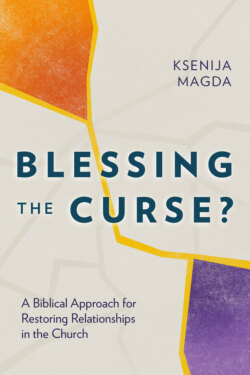Читать книгу Blessing the Curse? - Ksenija Magda - Страница 23
На сайте Литреса книга снята с продажи.
Male Hierarchy with Limited Transfer of Power
ОглавлениеThe first classic version, which is endorsed in many churches as biblical, places the father at the top of the family hierarchy as the ruler over his wife and children. The mother is subordinate to him, but she can rule the children in his absence. This arrangement alienates the parents from one another and eliminates space for intimacy in their home, leaving both feeling lonely. Intimacy should be not only sexual, but a deep feeling of concern and connection with another, which all humans need. Without intimacy, sexual relations become duties or rights, with the sole purpose being procreation, a display of power, or an expression of lust rather than love. Rather than creating mutual satisfaction, this leaves the wife feeling that she has been sexually abused. Mutual sexual satisfaction only develops when we have the freedom to give ourselves to one another and to share intimacy, a sense of belonging or partnership.
This hierarchical description of a “Christian marriage” is bound to alienate a father from his children. Because of his power and distance, he has no direct connection with his children. In fact, his hierarchical distance deems it a lack of respect if he expresses care for his children’s immediate needs, for their care has been transferred to the mother alone. A mother can further abuse and alienate an absentee father by treating him like a “grey eminency,” who comes home occasionally to deliver punishment to those who misbehave.
Women in such relationships are often overwhelmed by raising children, as they have been taught that they have no authority apart from their husbands, and so they cannot imagine how to discipline their children alone. With her husband remote and absent – and therefore unable to give her the intimacy she needs – she may take one of her children into her confidence. Confused about her loyalty, she burdens this child, forcing him or her into an adult role prematurely, where s/he has to become a mother or father to his or her own mother. Or she may find intimacy outside of her marriage and family, which contributes to the disintegration of the family.
Contrary to the popular myth, no man only needs sex and power. All humans need intimacy and true love, a place where they can be vulnerable and open, where they can share their deepest selves. A man who is seen as the sole provider and authority in a hierarchical family system is remote, alone, isolated. Forced to keep his distance, he cannot obtain intimacy in his family. When a man uses power over his wife and children, he experiences further exclusion from the love and affection in his home, which they share among themselves. Love cannot be ordered, and so he seeks intimacy outside his home. This pattern is enforced by a culture that defines a man’s worth by the number of women he can force into a relationship with him, a process that disintegrates his own family.
These are the inevitable outcomes of the hierarchical model that is presented in churches as biblical and God-ordained. Though globalization and migration have loosened this hierarchical system and revealed so-called “Christian marriages” as whitewashed tombs, the system has been held in place by strong traditions, taboos, and social norms. Now, global developments and fear are bringing this instant recipe for a strong traditional family back to haunt us. This is short-sighted, for if the system had worked in the past, women would not have needed liberation – let alone a sexual revolution. We would all be growing up in happy hierarchical homes! Obviously, hierarchical family structures did not work in the past either! The only difference today is that couples (women mostly) will not endure the endless disappointment of a philandering, emotionally detached, abusive god.
If we are serious about our Bible reading, we must understand that a hierarchical model reflects the curse – not God’s intention for marriage. In the past, societies could force people to stay together formally, but these traditional families have been anything but strong and nurturing. They may have kept up appearances, but there was a lot of stinking decay underneath, which is readily shown in the testimonies of literature or film. From a Christian perspective, hierarchical marriage is certainly not a model to replicate.
New movements for men and women, such as “Promise Keepers” or “Daughters of the King,” will not bring us forward, as they are just enforcing unhealthy stereotypes. Propagators of these hierarchies need to realise that a painted grave still stinks, and if family garbage is stored in a locked spare room, the neighbours will still choke on the stench of decay even if they cannot see it. In light of this, many people are running for their lives! Rather than enforcing stereotypes about manly or womanly behaviours, we need to be modelling true exchanges and partnerships, where women and men can become who they are at heart.
